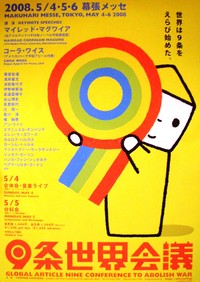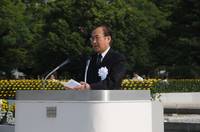Global Article 9 Conference To Abolish War
The Article of the Japanese Constitution which forever renounces war and armed forces - Article 9: the move to make it a common heritage of mankind.
Japan, 7th May 2008.
Yukari Saitō for the Documentation Centre “The Seeds Beneath The Snow”
Translated from Italian into English by Gerry Blaylock
“A success beyond our wildest expectations.” So said the organisers at the end of the international meeting “Global Article 9 Conference to Abolish War ” which took place at the Makuhari Messe International Convention Complex near Tokyo 4th-6th May.
The official figures confirm it: more than 12,000 people on the first day and 6,500 on the second took part in symposiums, round tables, forums and numerous workshops. To these should be added the 3,000 people on the first day and 500 on the second who were unable to enter the halls, which were bursting at the seams. Among the participants were at least 150 foreigners from 31 countries. In all, then, more than 22,000 people.
A comment expressed repeatedly by participants was: “We are witnessing a historical moment.”
Article 9 of the Japanese Constitution declares: Aspiring sincerely to an international peace based on justice and order, the Japanese people forever renounce war as a sovereign right of the nation and the threat or use of force as means of settling international disputes. And goes on to say: In order to accomplish the aim of the preceding paragraph, land, sea and air forces, as well as other war potential, will never be maintained. The right of belligerency of the state will not be recognised.
The importance of article 9 with respect to wars currently being fought around the world, and those its possible abolition – strongly pushed for by recent Japanese governments and their allies in Washington (for more information on this topic see note 1) - could provoke in Asia, was the central theme of the three-day Conference.
The numerous Japanese and international guest speakers emphasised the universality of the spirit of the Article and appealed to the Japanese Government not to ditch this precious part of the Constitution. Among the international guest speakers were, for example, the Nobel Peace Prize winner Mairead Corrigan Maguire; Cora Weiss of the Hague Appeal for Peace; Beate Sirota Gordon, drafter of the article in the Japanese Constitution on women's rights; Carlos Vargas Pizarro of the International Association of Lawyers Against Nuclear Arms (IALANA) and Professor of International Law from the Republic of Costa Rica, whose Constitution bans the threat or use of force, armed forces and military bases on its territory.
In addition, many Japanese and foreign musicians, film directors and artists also took part and performed.
During the first day, which saw speeches alternating with various performances on the stage of the gigantic Event Hall, a particularly interesting round table “Iraq, USA and Japan” took place. The panel comprised Aidan Delgado, an Iraq War Veteran who, after witnessing abuses at Abu Ghraib prison, applied for and received conscientious objector status. Sitting next to him was Kasim Turki, former soldier in the Iraqi Republican Guard and now a humanitarian aid worker with “Iraq Hope Network”, a Japanese-based consortium of NGOs. Then, Karin Amamiya, a young Japanese writer, an expert on poverty which she believes has been created on purpose in order to fuel wars around the globe. The session was opened by Ann Wright, former Army Colonel and Diplomat who publicly resigned in 2003 in opposition to the Iraq War. The debate was chaired by Naoko Takatō an aid volunteer who, together with two other Ja panese (two freelance journalists), was taken hostage in April 2004 by an armed group who demanded the withdrawal of Japanese troops who had been sent as support for the American troops. “But we were freed thanks to our attachment to the spirit of Article 9, which our kidnappers understood”.
The second day was given over to 6 symposiums, 2 special forums and numerous workshops, all around the theme of nonviolence and prevention .
The symposiums had the following titles:
1) World Conflicts and Nonviolence: mainstreaming the nonviolent approach;
2) Realizing the Spirit of Article 9 in Asia;
3) Women's Power of Building Peace;
4) Linking Peace and the Environment;
5) Nuclear Age and Article 9;
6) The Crisis and Future of Article 9.
One of the two Special Forums was organised by GPPAC (Global Partnership for the Prevention of Armed Conflict), an international conflict prevention network established upon the call of former UN Secretary General Kofi Annan. The focus of the Forum was “the potential of Article 9 as a conflict prevention mechanism and the role of civil society in this process.” The second Forum consisted in an international lawyers panel talking about their struggles for peace and how they could make use of Article 9 and its concept.
There was plenty of room for the stands of more than a hundred groups and associations from all over Japan, an area where activists could do some fund-raising and meet and exchange information with the visitors. Everywhere lots of young Japanese were milling around, which was striking since they are not normally attracted by events of a political nature. Kayoko Ikeda, a representative of the organising committee, enthusiastically praised the young volunteers “without whose extraordinary promptness and spontaneity it would have been difficult to get this event off the ground”. Another striking feature was the high proportion of women as speakers, members of symposiums, forums and workshops and as active participants.
The Conference closed after the morning session on the third day, attended by several hundred people, with feedback and reports from the symposiums, forums and workshops. Then three statements were announced:
1) A Global Article 9 declaration to abolish war, which calls for the construction of an international movement to render Article 9 a common heritage of mankind.
2) A Global Article 9 Conference statement towards the NPT Prep.Com., which was taking place in Geneva at the same time, in which it was pointed out that Article 9 was born out of the excruciating suffering of the peoples of Hiroshima and Nagasaki.
3) A Global Article 9 Conference statement to the G8, which takes place this year in Japan at Lake Tōyako in Hokkaido 7th-9th July. In this statement the G8 leaders are called on to discuss topics such as disarmament, the environment, global corporate social responsibility to peace. The G8 leaders are reminded their countries account for 70% of world military expenditure. (see note 2 for fuller versions of these 3 statements)
Between one speech and another time was dedicated to audience participation. Some gave feedback on small meetings held on the second day, others presented their initiatives in support of article 9 and there were even those who denounced the contradiction between the Constitution and the reality of Japan being the fourth military power in the world: “What regulates politics in Japan is not so much the Constitution as the Mutual Cooperation and Security Treaty between Japan and the United States. The time has come to question it given that it is due for renewal in 2010.”
Emphasis was also placed on the relationship between article 9 and the environment – a new tack for an event like this. Money spent by the government for military purposes would be better directed towards protecting the environment, which is also endangered and polluted by military activity: the issue of depleted uranium, for instance, which was the subject of a session organised by one of the groups represented at the meeting.
One of the interesting outcomes of the Conference was just how many groups around the world there are who actively support article 9: in Canada, Germany, Switzerland, the United States, Australia, South Korea and China. Each group is therefore a base from which the spirit of article 9 can spread. Each group can raise awareness among those Japanese resident abroad and give moral support to the Japanese activists.
“We can say that for the first time in our history article 9 has gained world recognition”, said Tatsuya Yoshioka, of Peace Boat (see note 3), main promoter and coordinator of the event. “It may be a sign that the time is ripe to place at the centre of our lives a new value represented by article 9. Japanese citizens are beginning to realise that a link exists between article 9 and the rest of the world and that through this article we can make a great contribution to the international community.”
The Conference was conceived by a small group of young Peace Boat activists around ten years ago. “We were considering it above all in connection with Asian countries”, continued Yoshioka, “ but then we found great interest in article 9 among countries afflicted by war. Once we had a clear idea of the project it was easy to realise it thanks to the international network which Peace Boat has built up over the years.”
Considering that 4,000 people and 71 non-governmental organisations from 112 countries (as of the end of April 2008) adhered to the initiative, and the wave of enthusiasm displayed by those who participated in the Conference at Makuhari, it is more than likely that there will be a repetition in two years' time. Further, in order to make it more influential on national and international politics, a preparatory conference has been suggested by Carlos Vargas Pizarro, in Costa Rica – one of the few countries in the world without an army or US bases.
Those who wish can sign on the “support article 9” page at: http://www.article-9.org/
Note 1)
“Today, however, the Japanese government is moving towards amending Article 9, partly due to the U.S. demand for full-fledged military support from Japan in its “war on terror”. Despite the restrictions of Article 9, Japan’s Self-Defence Forces have gradually expanded over the years, bringing Japan’s military expenditure to one of the highest in the world, and they provided support to U.S. Military operations in Afghanistan and Iraq. The move to amend Article 9 for the worse gathered speed during former Prime Minister Shinzo Abe’s tenure. In September 2006, Abe announced he would seek a constitutional revision within five to six years. In May 2007, the Japanese Diet passed legislation to hold a national referendum to revise the constitution and amend Article 9. Although Abe is no longer in power, Article 9 related debates have continued to inflame Japanese politics, especially around the renewal of the Anti-Terrorism Special Measures Law, which has authorized the Maritime Self-Defence Force to refuel US vessels in the Indian Ocean for their operations in Afghanistan. In light of the difficulty to renew this bill, some government officials are calling for a permanent law to dispatch Self-Defence Forces overseas whenever necessary, a move perceived as a first step towards amending Article 9.” (from the GPPAC Japan website “about campaign”)
However, on 17th April the Nagoya High Court ruled that the dispatch of Air Self-Defence Force personnel to Iraq was unconstitutional.
According to the latest survey in April of this year by the daily newspaper Asahi Shimbun, and confirmed by the more conservative Yomiuri Shimbun , the percentage of people against an amendment of Article 9 has risen from last years 50% to 66%.
Note 2)
1) Article 9 of the Japanese Constitution renounces war and the threat or use of force as a means of settling international disputes. Further, it prohibits the maintenance of armed forces and other war potential. Article 9 is not just a provision of Japanese law; it can also act as an international peace mechanism that can be adopted by other states to maintain peace throughout the world. The Global Article 9 Conference to Abolish War strives to build an international movement supporting Article 9 as a shared property of the world, and calls for a global peace that does not rely on force.
2) Article 9 of Japan's Constitution was born out of the excruciating human agony and devastating destruction brought about by the nuclear bombings on Hiroshima and Nagasaki. Following the nuclear attacks on two of its cities, Japan renounced war and the threat or use of force as a means of settling international disputes and prohibited the maintenance of armed forces and other war potential. Thus, the spirit of Article 9 reflects the appeal of hibakushas (the A-bomb survivors) calling for “No more Hibakushas, No more Hiroshima/Nagasaki, No more Wars” and rejects dependence on nuclear weapons in security policies and demands that all nuclear weapons be outlawed and abolished.
3) We, the under-signed participants and supporters of the Global Article 9 Conference to Abolish War, recall the recommendations made in the final declaration of the conference about the potential of Article 9 of the Japanese Constitution as an international mechanism to promote peace and global stability, and further call on G8 leaders, ahead of the Summit taking place in July in Hokkaido, Japan, to:
Peace
Promote and realize the fundamental human right to live in peace by supporting conflict prevention, peacebuilding and human security initiatives by peaceful means.
“ War on Terror”
Put an end to the open-ended U.S.- led “war on terror” that generates fear and repression and promotes hatred and violence; and instead address the root causes of terrorism through international cooperation, using international law and respecting human rights.
Disarmament, including the abolition of nuclear weapons
Strengthen multilateral efforts to achieve nuclear non-proliferation and disarmament towards the abolition of nuclear weapons. G8 countries must promote negotiations towards the early conclusion of the Arms Trade Treaty; foster a government-level process towards a total ban of cluster munitions; ensure the full implementation of the Landmine Ban Treaty; and build an international consensus for prohibiting the use of depleted uranium as a first step towards a comprehensive process of disarmament and demilitarization.
Development
Promote initiatives linking disarmament to development and human security, and establish a ratio of military spending to be dedicated to national development expenditure towards the MDGs and beyond.
Environment
Recognize and reverse the negative impacts of war and the military on the environment and commit to address the well-recognized threat posed by outside interference and fight for control of the increasingly scarce natural resources and energy sources as a catalyst of conflict.
Global Corporate Social Responsibility to Peace
Create and enforce structures and systems to uphold the corporate social responsibility of the private sector, including towards peace, human rights and environmental protection.
Note 3)
“Peace Boat is a Japan-based international non-governmental and non-profit organization that works to promote peace, human rights, equal and sustainable development and respect for the environment. It seeks to create awareness and action based on effecting positive social and political change in the world. We pursue this through the organization of global educational programmes, responsible travel, cooperative projects and advocacy activities. These activities are carried out on a partnership basis with other civil society organizations and communities in Japan, Northeast Asia, and around the world. Peace Boat carries out its main activities through a chartered passenger ship that travels the world on peace voyages. The ship creates a neutral, mobile space and enables people to engage across borders in dialogue and mutual cooperation at sea, and in the ports that we visit. Activities based on Japan and Northeast Asia are carried out from our eight Peace Centers in Japan.” (from the Peace Boat website)





